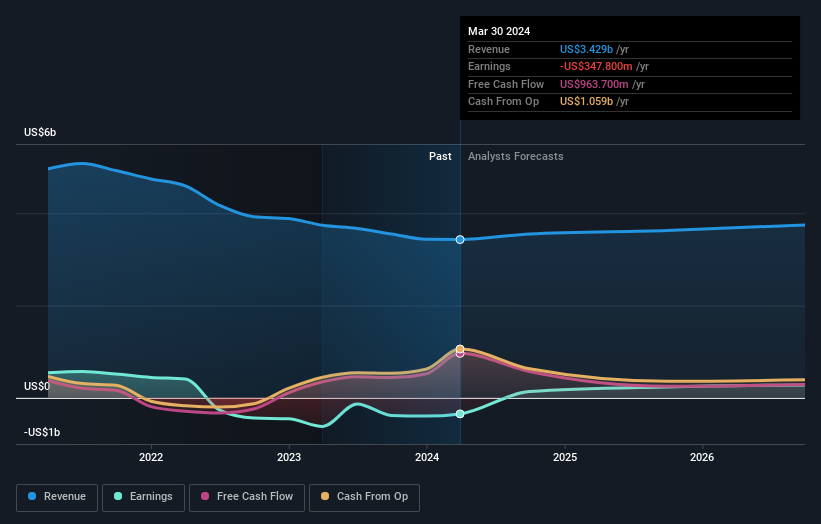- United States
- /
- Chemicals
- /
- NYSE:SMG
Strong week for Scotts Miracle-Gro (NYSE:SMG) shareholders doesn't alleviate pain of three-year loss

If you are building a properly diversified stock portfolio, the chances are some of your picks will perform badly. But long term The Scotts Miracle-Gro Company (NYSE:SMG) shareholders have had a particularly rough ride in the last three year. So they might be feeling emotional about the 65% share price collapse, in that time.
On a more encouraging note the company has added US$151m to its market cap in just the last 7 days, so let's see if we can determine what's driven the three-year loss for shareholders.
See our latest analysis for Scotts Miracle-Gro
Because Scotts Miracle-Gro made a loss in the last twelve months, we think the market is probably more focussed on revenue and revenue growth, at least for now. When a company doesn't make profits, we'd generally hope to see good revenue growth. As you can imagine, fast revenue growth, when maintained, often leads to fast profit growth.
Over the last three years, Scotts Miracle-Gro's revenue dropped 15% per year. That's definitely a weaker result than most pre-profit companies report. Arguably, the market has responded appropriately to this business performance by sending the share price down 18% (annualized) in the same time period. Bagholders or 'baggies' are people who buy more of a stock as the price collapses. They are then left 'holding the bag' if the shares turn out to be worthless. After losing money on a declining business with falling stock price, we always consider whether eager bagholders are still offering us a reasonable exit price.
The company's revenue and earnings (over time) are depicted in the image below (click to see the exact numbers).

This free interactive report on Scotts Miracle-Gro's balance sheet strength is a great place to start, if you want to investigate the stock further.
What About Dividends?
It is important to consider the total shareholder return, as well as the share price return, for any given stock. The TSR is a return calculation that accounts for the value of cash dividends (assuming that any dividend received was reinvested) and the calculated value of any discounted capital raisings and spin-offs. So for companies that pay a generous dividend, the TSR is often a lot higher than the share price return. We note that for Scotts Miracle-Gro the TSR over the last 3 years was -61%, which is better than the share price return mentioned above. This is largely a result of its dividend payments!
A Different Perspective
Scotts Miracle-Gro shareholders gained a total return of 22% during the year. But that return falls short of the market. On the bright side, that's still a gain, and it is certainly better than the yearly loss of about 4% endured over half a decade. It could well be that the business is stabilizing. While it is well worth considering the different impacts that market conditions can have on the share price, there are other factors that are even more important. Like risks, for instance. Every company has them, and we've spotted 2 warning signs for Scotts Miracle-Gro (of which 1 is a bit unpleasant!) you should know about.
If you are like me, then you will not want to miss this free list of undervalued small caps that insiders are buying.
Please note, the market returns quoted in this article reflect the market weighted average returns of stocks that currently trade on American exchanges.
New: Manage All Your Stock Portfolios in One Place
We've created the ultimate portfolio companion for stock investors, and it's free.
• Connect an unlimited number of Portfolios and see your total in one currency
• Be alerted to new Warning Signs or Risks via email or mobile
• Track the Fair Value of your stocks
Have feedback on this article? Concerned about the content? Get in touch with us directly. Alternatively, email editorial-team (at) simplywallst.com.
This article by Simply Wall St is general in nature. We provide commentary based on historical data and analyst forecasts only using an unbiased methodology and our articles are not intended to be financial advice. It does not constitute a recommendation to buy or sell any stock, and does not take account of your objectives, or your financial situation. We aim to bring you long-term focused analysis driven by fundamental data. Note that our analysis may not factor in the latest price-sensitive company announcements or qualitative material. Simply Wall St has no position in any stocks mentioned.
Have feedback on this article? Concerned about the content? Get in touch with us directly. Alternatively, email editorial-team@simplywallst.com
About NYSE:SMG
Scotts Miracle-Gro
Manufactures, markets, and sells products for lawn, garden care, and indoor and hydroponic gardening in the United States and internationally.
Reasonable growth potential average dividend payer.


